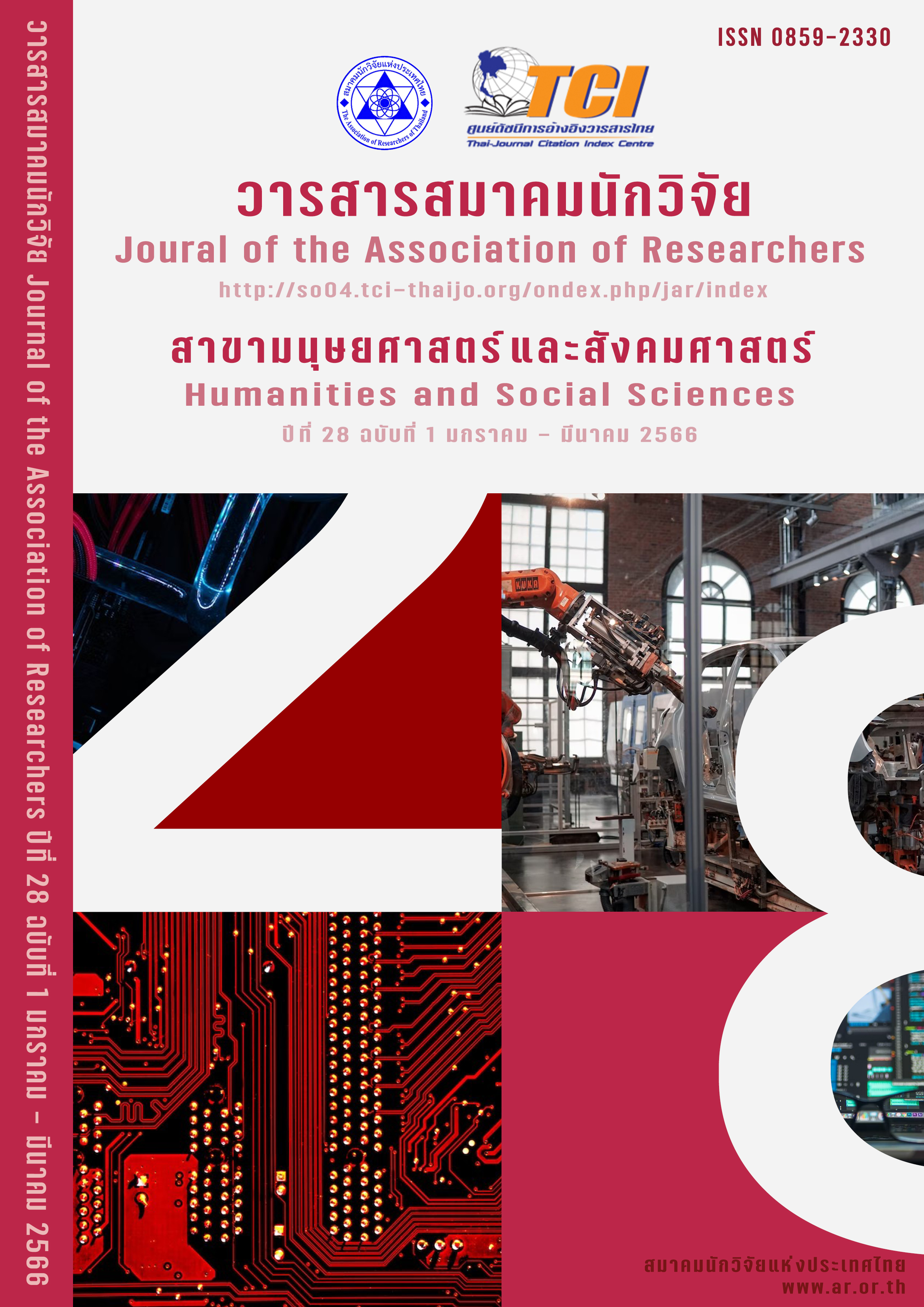The Use of Corrective Feedback Technique to Promote Prathom 5 Students’ Disciplines in Submitting Arts Assignments in Mahachai Christian Wittaya School
Main Article Content
Abstract
Giving an assignment to primary students in the arts course is necessary as it is the way to promote them to practice and do it by themselves at home. It also needs time and an imagination of students to produce their masterpiece apart from an in-class activity. However, it was found that primary students lacked of any responsibilities of submitting the arts assignments. This experimental research aimed to compare Prathom 5 students’ disciplines in submitting Arts assignments in Mahachai Christian Wittaya School before and after the use of corrective feedback. Samples were 24 students in grade 11 being selected by the use by the purposive selection technique. Research instruments were an assignment form, the scoring form of assignment, the learning log, and an interview form. The data were collected in the 2nd semester of 2021 academic year. Frequency, mean, percentage, and t-test for dependent samples were used to analyze quantitative data. A content analysis was used to analyze qualitative data. The result revealed that students who got the corrective feedback submitted more Arts assignments at .05 significant level. The finding, as the new knowledge of this study proved that the corrective feedback was effective to promote students’ submission of assignments.
Article Details

This work is licensed under a Creative Commons Attribution-NonCommercial-NoDerivatives 4.0 International License.
บทความที่ปรากฏในวารสารนี้ เป็นความรับผิดชอบของผู้เขียน ซึ่งสมาคมนักวิจัยไม่จำเป็นต้องเห็นด้วยเสมอไป การนำเสนอผลงานวิจัยและบทความในวารสารนี้ไปเผยแพร่สามารถกระทำได้ โดยระบุแหล่งอ้างอิงจาก "วารสารสมาคมนักวิจัย"
References
จุมพต พุ่มศรีภานนท์. (2555). การวิจัยในชั้นเรียน: เครื่องมือสําคัญของครูวิทยาศาสตร์. วารสารหน่วยวิจัยวิทยาศาสตร์เทคโนโลยีและสิ่งแวดล้อมเพื่อการเรียนรู้. 3(2): 121-125.
ชนิกามาศ จันทร์เจริญสุข. (2557). การประยุกต์ใช้กระบวนการเรียนรู้ผ่านเครือข่ายสังคมออนไลน์เพื่อแก้ไขมโนทัศน์ที่คลาดเคลื่อนในการทำวิจัยในชั้นเรียนของครู. วิทยานิพนธ์ระดับบัณฑิตศึกษา. กรุงเทพฯ: บัณฑิตวิทยาลัย จุฬาลงกรณ์มหาวิทยาลัย
เทวี ประสาท. (2546). ศิลปะ: รากฐานแห่งการศึกษา. กรุงเทพฯ: โครงการสรรพสาส์น สำนักพิมพ์มูลนิธิเด็ก.
ธนิกานต์ อากาศวิภาต. (2548). การยอมรับความสำคัญของการสะท้อนผลการปฏิบัติงาน ลักษณะของผู้สะท้อนผลการปฏิบัติงานกับความต้องการในการพัฒนาตนเองของพนักงาน. วิทยานิพนธ์ปริญญามหาบัณฑิต สถาบันเทคโนโลยีพระจอมเกล้าพระนครเหนือ
ธีระวุฒิ เอกะกุล. (2552). การวิจัยปฏิบัติการ. อุบลราชธานี: ยงสวัสดิ์อินเตอร์กรุ๊ป
ปาริฉัตร บุญต้อม. (2557). ปฏิสัมพันธ์ระหว่างการสะท้อนคิดของผู้เรียนและการให้ข้อมูลย้อนกลับของผู้สอนในการพัฒนาแฟ้มสะสมงานอิเล็กทรอนิกส์ที่มีต่อการสร้างสรรค์งานคอมพิวเตอร์กราฟิกของนักเรียน. วิทยานิพนธ์ระดับบัณฑิตศึกษา. กรุงเทพฯ: บัณฑิตวิทยาลัย จุฬาลงกรณ์มหาวิทยาลัย
ผ่องพรรณ ตรัยมงคลกุล. (2543). การวิจัยในชั้นเรียน. พิมพ์ครั้งที่ 3. กรุงเทพฯ: สำนักพิมพ์มหาวิทยาลัยเกษตรศาสตร์.
วิภาพรรณ เจริญกุล. (2559). การศึกษาสาเหตุการไม่ส่งการบ้านตามกำหนดในวิชาจิตวิทยาเพื่อการพัฒนาตนเองของนักศึกษาชั้นปีที่ 1 หลักสูตรคอมพิวเตอร์ธุรกิจ มหาวิทยาลัยสวนดุสิต ศูนย์ตรัง. รายงานสืบเนื่องจากการประชุมหาดใหญ่วิชาการระดับชาติและนานาชาติครั้งที่ 7. 23 มิถุนายน 2559 มหาวิทยาลัยหาดใหญ่. หน้า 1065-1076
วัลลภา เทพหัสดิน ณ อยุธยา. (2544). การพัฒนาการเรียนการสอนทางอุดมศึกษา. กรุงเทพฯ: จุฬาลงกรณ์มหาวิทยาลัย.
โสภาวรรณ ศรีปัญญา. (2564). การศึกษาพฤติกรรมของนักเรียนชั้นประถมศึกษาปีที่ 5 โรงเรียนอนุบาลภูเก็ตในเรื่องการไม่ส่งงานและการบ้าน. รายงานการวิจัย. ภูเก็ต: โรงเรียนอนุบาลภูเก็ต.
สุวิมล ว่องวานิช. (2554). การวิจัยปฏิบัติการในชั้นเรียน. พิมพ์ครั้งที่ 15. กรุงเทพฯ: สำนักพิมพ์แห่งจุฬาลงกรณ์มหาวิทยาลัย.
อนงค์ เมธีพิทักษ์ธรรม. (2555). ผลของรูปแบบการให้ข้อมูลย้อนกลับที่แตกต่างกันต่อความสามารถในการแก้ไขปัญหาทางคณิตศาสตร์ของผู้เรียนระดับมัธยมศึกษาปีที่ 1. วิทยานิพนธ์ระดับบัณฑิตศึกษา. กรุงเทพฯ: บัณฑิตวิทยาลัย จุฬาลงกรณ์มหาวิทยาลัย
อรุณศรี อนันตรศิริชัย. (2531). การให้การบ้าน. วารสารวิธีวิทยาการวิจัย คณะครุศาสตร์ จุฬาลงกรณ์มหาวิทยาลัย. 3(1): 31-34.
The Standard. (2019). กลเม็ดในการให้ Feedback ที่ตรงเป้าและเข้าใจกันทั้งสองฝ่าย. ออนไลน์: https://thestandard.co/podcast/superproductive06/ สืบค้นเมื่อ 16 มิถุนายน 2021.
Translated Thai References
Anantarasirichai, A. (1988). Giving an assignment to students. Journal of Research Methodology, Faculty of Education, Chulalongkorn University. 3(1): 31-34.
Arkartwipat, T. (2005). The Acceptance of the Importance of Reflection on Work Performance, Characteristics of Reflectors and Needs in Self Developing of Employees. Thesis. King Mongkut's University of Technology North Bangkok.
Buntom, P. (2014). An Interaction between learner Reflection and Teacher Feedback in Electronic Portfolio Development on Students’ Computer Graphic Creation. Thesis. Bangkok: Graduate School, Chulalongkorn University.
Chancharoensuk, C. (2014). An Application of Learning Processes via Online Social Network to Correct Teachers’ Misconceptions in Classroom Action Research. Thesis. Bangkok: Graduate School, Chulalongkorn University.
Charoenkul, V. (2016). The Study Why Not Send Homework as Scheduled in the Development of Psychology Subject, 1st Business Computer Students in Suan Dusit University, Trang Center. Proceeding in 7th National and International Hat Yai Meeting, 23rd June 2016 at Hat Yai University: page 1065-1076.
Ekakul, T. (2009). Action research. Ubonratchathani: Yongsawat Intergroup.
Maeteepithaktham, A. (2012). The effects of different feedback styles on the ability to solve mathematics problems of seventh grade students. Thesis. Bangkok: Graduate School, Chulalongkorn University.
Office of the Basic Education Commission, Ministry of Education (2008). Indicators and core learning subjects: Arts based on the basic education curriculum B.C. 2551. Bangkok: Office of the Basic Education Commission, Ministry of Education.
Poomsripanon, C. (2012). Classroom research: A key instrument for science teachers. Journal of Research Unit on Science, Technology and Environment for Learning. 3(2): 121-125.
Prasart, T. (2003). Arts: The foundation of Education. Bangkok: Sappasart project, Foundation for Children Press.
Sripanya, S. (2021). A Study of Prathom 5 students’ behavior in not submitting an assignment and homework. Research. Phuket: Anuban Phuket School.
Thephatsadin na Ayuthaya, W. (2001). The Development of teaching and learning in higher education. Bangkok: Chulalongkorn University.
The Standard. (2019). The Tactics in Giving Feedback. Online: https://thestandard.co/podcast/superproductive06/ Retrieved 16 June 2021.
Trimongkolkul, P. (2000). Classroom Research. 3rd edition. Bangkok: Kasertsart University Press.
Wongwanich, S. (2011). Classroom action research. 5th edition. Bangkok: Chulalongkorn University Press.


